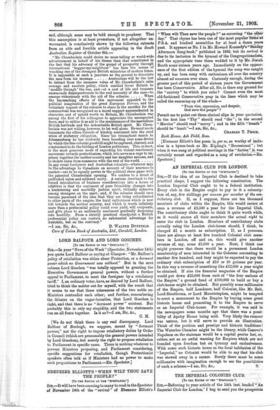AN IMPERIAL CLUB FOR LONDON.
[To THE EDITOR OF THE " SPECTATOR." J SIR,—If the idea of an Imperial Club is destined to take practical shape, I suggest the following constitution. The London Imperial Club ought to be a federal institution. Every club in the Empire ought to pay to it a subscrip- tion of, say, five shillings per annum per member of the con- tributory club. If, as I suppose, there are ten thousand members of clubs within the Empire, this would secure at once a revenue of £2,500 a year for the Imperial Club. The contributory clubs ought to think it quite worth while, as it would secure all their members the actual right to enter the club in London. Members of contributory clubs actually using the London club-house should, I think, be charged £1 a month as subscription. If, as I presume, there are always at least five hundred Colonial club mem- bers in London, off and on, this would give another revenue of, say, some 25,000 a year. Next, I think one might presume that there would be a permanent London membership of men interested in the Colonies amounting to another five hundred, and they might be expected to pay the ordinary club subscription of 210 or 10 guineas per year. In this way a revenue of something like £12,000 a year might be obtained. If also the financial magnates of the Empire would put down 225,000 from each of "the four nations of the Empire," a ground fund of 2100,000 to build or buy a club-house might be obtained. But possibly some millionaire of the Empire, half Londoner, half Colonist, like Mr. Belt, Lord Strathcona, or Lord Mountstephen, might be tempted to erect a monument to the Empire by buying some great historic house and presenting it to the Empire to serve as an Imperial Club-house. For example, it was said in the newspapers some months ago that there was a possi- bility of Apsley House being sold. Very likely the rumour was untrue, but it will serve to provide an illustration. Think of the position and prestige and historic traditions ! The Waterloo Chamber might be the library, while Canova's Napoleon on the staircase would be a capital genius loci, or, rather, act as an awful warning for Empires which are not founded upon freedom but on tyranny and exclusiveness. With some such historic house as the local habitation of the "Imperial," no Colonist would be able to say that his club was stowed away in a corner. Surely there must be some millionaire with imagination enough to see the possibilities
of such a scheme.—I am, Sir, &c., S.


























































 Previous page
Previous page